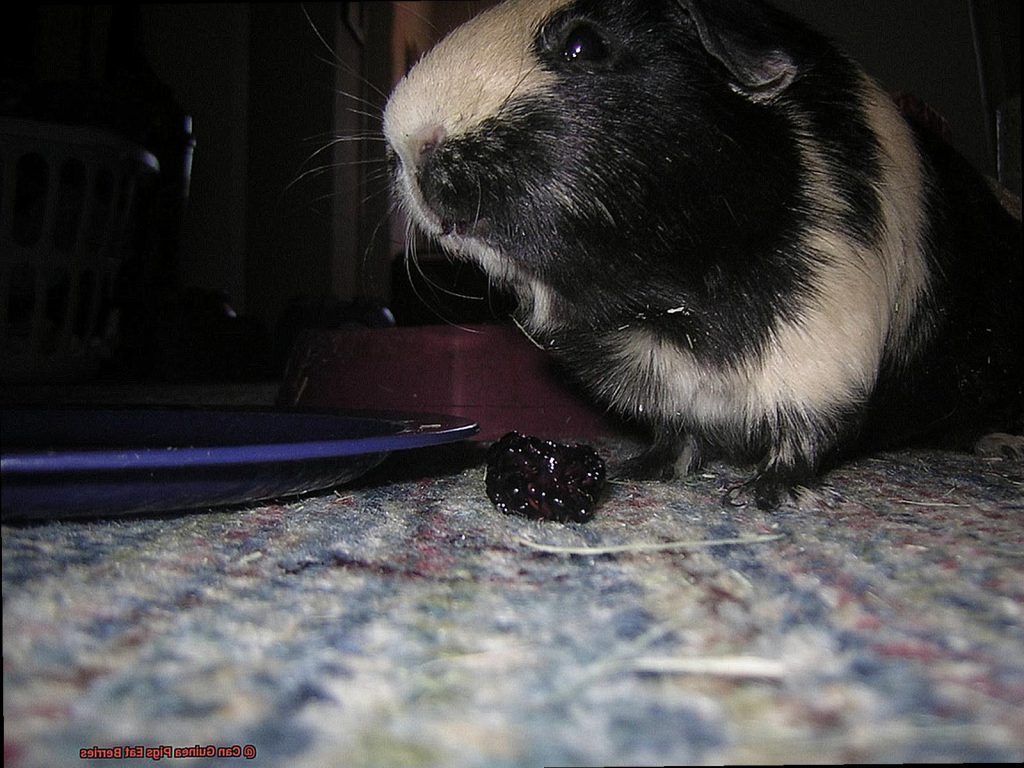Do you love spoiling your adorable guinea pig with tasty treats?
While hay and pellets are essential to their diet, fresh fruits and vegetables can provide a variety of nutrients to keep them healthy and happy. Have you ever considered giving your furry friend some berries?
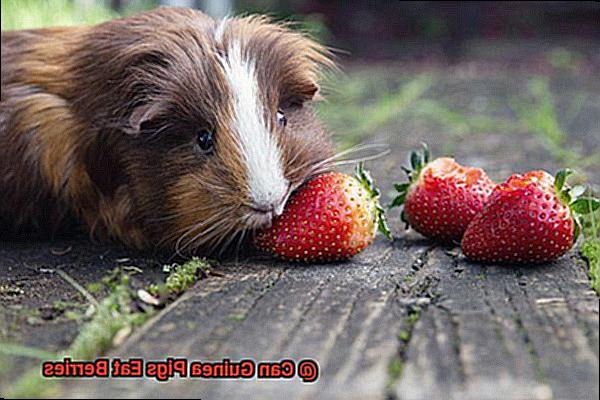
These little, sweet treats come in different colors and flavors, making them an enticing option. But before you hand over your berry stash, it’s crucial to know if they are safe for your pet.
So, can guinea pigs eat berries? In this blog post, we’ll explore the answer to this question.
We’ll discuss which types of berries are recommended for your piggy’s digestive system and dispel any myths surrounding certain fruits that could be harmful to your pets. Whether you’re a new or experienced guinea pig owner, we’ve got everything you need to know about feeding berries to your furry friend.
Keep reading.
What Do Guinea Pigs Eat?
Contents
While hay, spinach, and pellets are the foundation of their diet, offering berries as a snack is a great way to add variety and flavor to their meals.
But, what types of berries are safe for guinea pigs to eat? Luckily, there are several options that are both tasty and beneficial for their health.
Strawberries, blueberries, raspberries, and blackberries are all popular choices that pack a punch of antioxidants and vitamin C essential for your guinea pig’s immune system. However, it’s crucial to remember that moderation is key when feeding your guinea pig berries.
Too much sugar can cause digestive problems and even lead to obesity. While your guinea pig may love the taste of sweet strawberries or juicy blackberries, it’s still important to limit their intake.
Additionally, it’s vital to steer clear of toxic berries. Elderberries, holly berries, and mistletoe berries should never be given to your guinea pig because they can cause severe health issues such as seizures or even death.
Before serving up any berries, make sure to wash them thoroughly and remove any stems or leaves. And remember, fruits should only make up a small portion of their diet.
Stick with safe alternatives like strawberries, raspberries, blackberries, and blueberries, and avoid toxic berries at all costs.
Can Guinea Pigs Eat Berries?
As a herbivorous animal, guinea pigs require a diet rich in Vitamin C, fiber, and essential nutrients. Thankfully, certain types of berries are both safe and beneficial for these furry friends to consume in moderation.
Strawberries, raspberries, blueberries, and blackberries are all safe berry options for guinea pigs. These fruits are packed with Vitamin C, fiber, and antioxidants that can enhance immune function and aid in digestion.
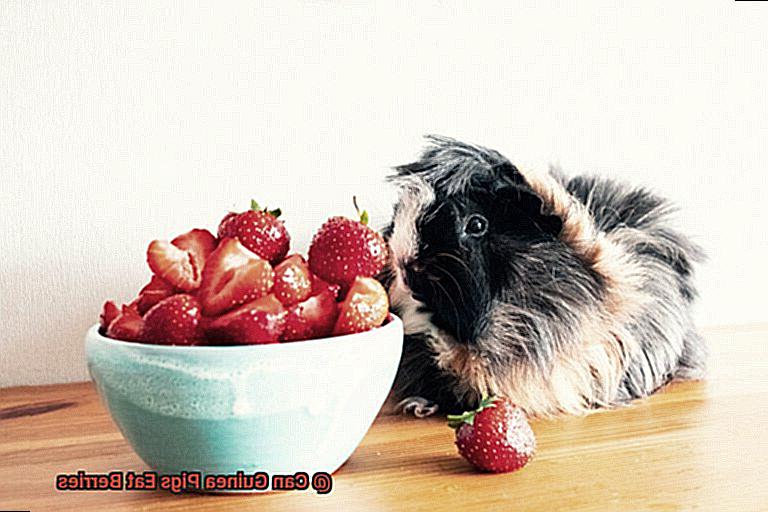
However, it’s important to keep in mind that berries are also high in sugar content. Therefore, it’s best to offer them only as occasional treats to avoid any potential health issues.
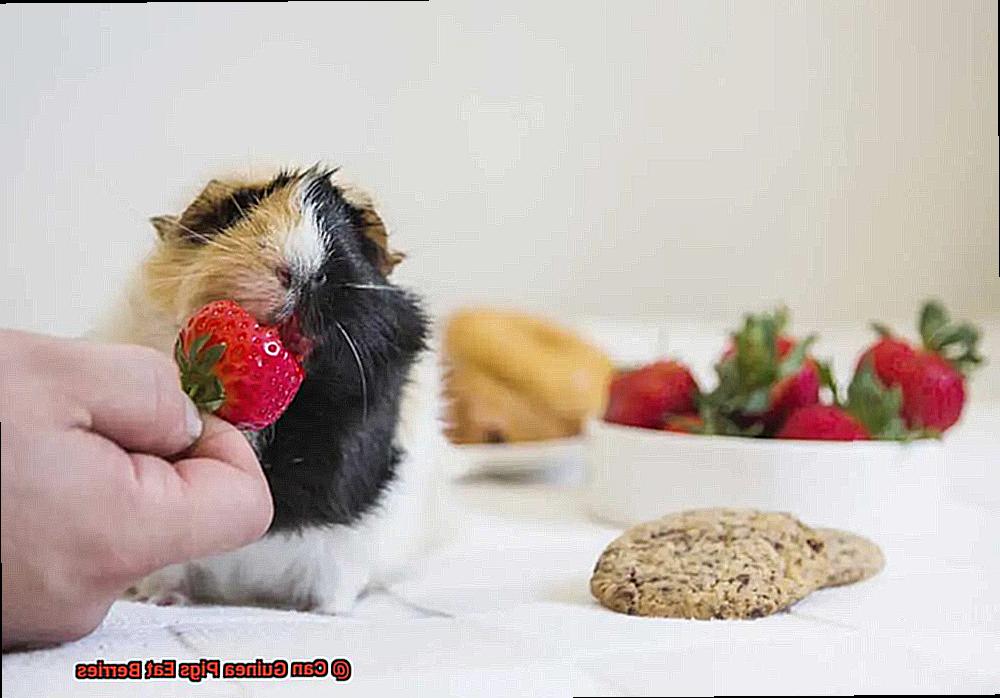
Before introducing berries into your guinea pig’s diet, start with small amounts and monitor their reactions closely. If there are any signs of discomfort or digestive issues, it may be best to avoid this type of fruit.
Remember to thoroughly wash and cut the berries into small pieces to prevent choking hazards. Additionally, make sure to remove any seeds or pits from the fruit before feeding it to your pet.
It’s crucial to note that not all types of berries are safe for guinea pigs. Avoid toxic berries like mistletoe or holly at all costs.
Stick with the safe options like strawberries, raspberries, blueberries, and blackberries. In conclusion, adding berries to your guinea pig’s diet can be a healthy way to provide them with essential nutrients while still satisfying their taste buds.
To ensure your pet’s overall health and well-being, always consult with a veterinarian before making any significant changes to their diet.
Benefits of Eating Berries for Guinea Pigs
Berries are not only a delicious treat for humans, but they also offer numerous health benefits to our furry friends – guinea pigs.
These small, sensitive animals love to munch on sweet treats, but it is important to ensure that they are consuming safe and healthy foods.
Luckily, the addition of berries to their diet can offer significant advantages, making for a tasty and nutritious snack.
Berries are rich in antioxidants, which play a crucial role in protecting cells from damage by free radicals. This can help prevent serious health conditions such as cancer and heart disease.
Additionally, certain berries such as strawberries and raspberries contain high levels of vitamin C, which supports the immune system of guinea pigs and shields them from infections. Moreover, berries contain flavonoids that possess anti-inflammatory properties.
This can help reduce inflammation within the body, preventing conditions such as arthritis and promoting overall health. Guinea pigs require sources of vitamin K, which is essential for blood clotting, as they may not produce enough of it on their own.
Berries are an excellent source of this nutrient and should be included in their daily diet. When feeding berries to guinea pigs, it is crucial to introduce them gradually and in small amounts.
Overfeeding them with too much fruit can cause digestive problems and diarrhea. Therefore, it is recommended that no more than 1-2 tablespoons of fruit be given to guinea pigs per day.
Types of Berries That Are Safe for Guinea Pigs to Eat
Berries are a delicious and nutritious addition to your guinea pig’s diet.

However, not all berries are safe for our little furry friends. That’s why it’s crucial to choose the right types of berries that won’t harm your guinea pig’s tummy.
Here are some types of berries that are safe for guinea pigs to eat:
Strawberries
These juicy red fruits are packed with vitamin C and fiber, essential nutrients for your guinea pig’s health. However, because strawberries contain natural sugar, it’s best to give them in moderation.
Blueberries
These tiny blue gems are an excellent source of vitamin C and fiber, making them a fantastic option for your guinea pig’s diet.
Plus, they’re low in sugar compared to other fruits.
Raspberries
Raspberries provide vitamin C and fiber but have a high sugar content. Thus, they should be given in moderation to avoid upsetting your guinea pig’s tummy.
Blackberries
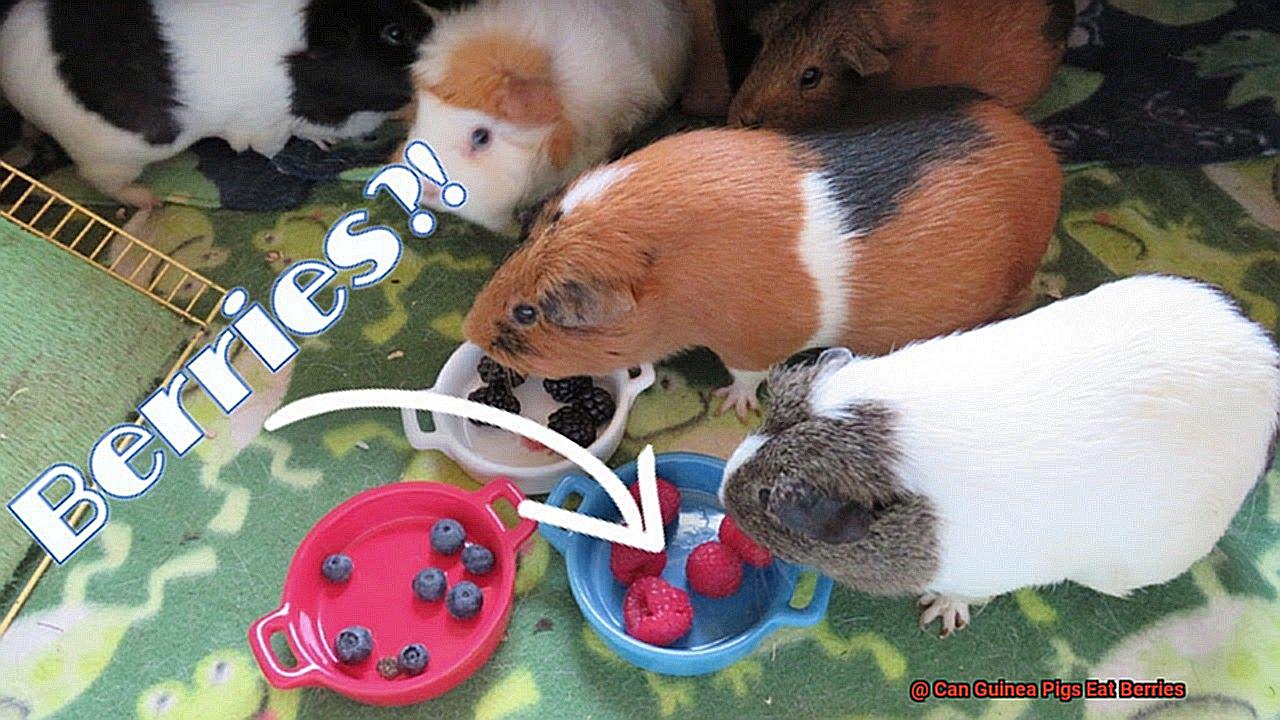
Blackberries have similar nutritional content to raspberries and should also be given in moderation.
Cranberries
These tangy red berries are a great source of vitamin C and antioxidants.
However, they should only be served in small quantities as too much can cause digestive upset. Remember, even though these types of berries are safe for your guinea pig to eat, it’s still important to serve them in moderation.
Too much fruit can lead to tummy troubles and other health problems. When introducing new foods to your guinea pig’s diet, start slowly and monitor their reactions.
If you notice any signs of digestive upset or other health issues, stop feeding the berries immediately and consult with a veterinarian if necessary.
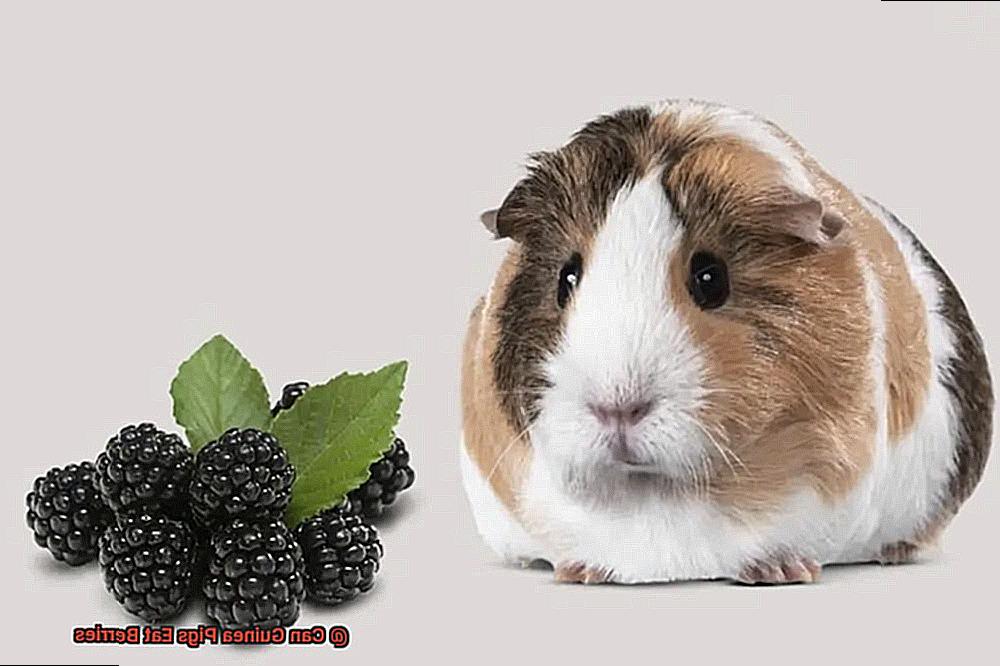
Types of Berries That Are Toxic to Guinea Pigs
While berries may seem like a nutritious addition to your guinea pig’s diet, it’s important to know that not all berries are safe for them to consume.
In fact, some berries contain toxic compounds that can cause digestive problems, kidney damage, respiratory distress, seizures, and even death.
Some types of berries that are toxic to guinea pigs are strawberries, raspberries, blackberries, cherries, holly berries, and mistletoe berries.
These berries are loaded with harmful compounds such as oxalic acid, tannins, and cyanogenic glycosides that can have devastating effects on your pet.
For example, strawberries contain high levels of oxalic acid which can lead to bladder stones in guinea pigs.
- Raspberries also contain oxalic acid and can result in digestive problems such as bloating and diarrhea.
- Blackberries have tannins that can interfere with nutrient absorption in their bodies.
- Cherries are laden with cyanogenic glycosides which can cause respiratory distress and seizures.
- Holly berries and mistletoe berries are highly toxic and can even lead to cardiac arrest and death.
Fortunately, there are still plenty of safe berry options that you can offer your furry friend.
Blueberries, cranberries, and strawberries without the leaves or hulls are all fantastic choices that won’t harm your guinea pig.
These types of berries have lower levels of harmful compounds and offer essential vitamins and antioxidants that are beneficial to your pet’s health. It’s crucial always to do proper research before introducing any new food item into your pet’s diet.
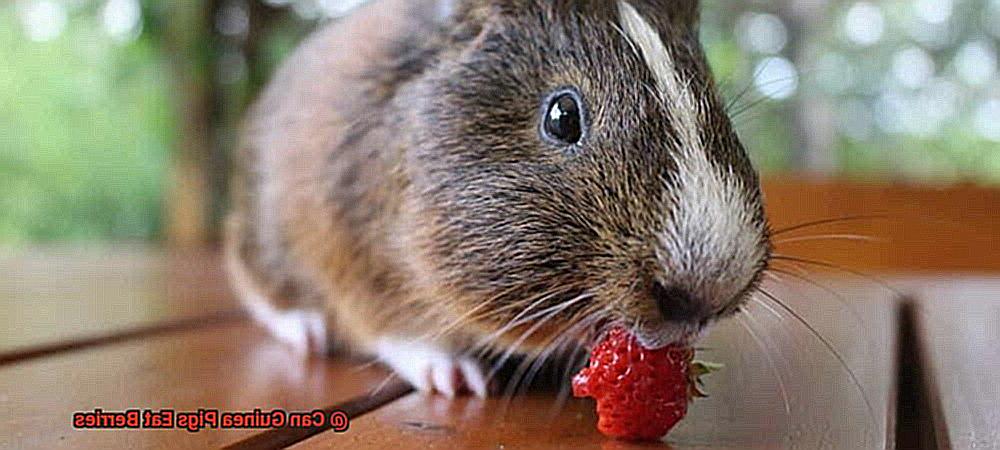
If you have any concerns or questions about your guinea pig’s dietary needs or health, consult with a veterinarian right away.
MDJ-WwFEFXo” >
Moderation Is Key When Feeding Guinea Pigs Berries
When it comes to feeding your beloved guinea pigs berries, it’s important to remember that moderation is key.
These adorable little creatures may adore the taste of these juicy treats, but excessive consumption can lead to some serious health issues.
You might want to indulge, but you know that overindulging will lead to a stomachache and regret later on. The same goes for your furry friends – while they may love berries, too much can result in weight gain and other health problems.
But don’t worry, there are still plenty of safe and nutritious berries that guinea pigs can enjoy in moderation. Some great choices include strawberries, raspberries, and blueberries.
These berries are low in sugar and high in vitamin C, which is essential for your guinea pig’s health. To ensure that your guinea pig stays healthy and happy, be sure to wash their berries thoroughly and remove any stems or leaves before serving.
And always remember that not all berries are safe for your furry friends – grapes and cherries are among those that can be toxic and should never be given to them.
Also Read: Can Guinea Pigs Eat Blueberries?
Conclusion
In conclusion, berries make a scrumptious and nutritious addition to your guinea pig’s diet.
However, it’s crucial to select the right ones and serve them in moderation. Strawberries, blueberries, raspberries, and blackberries are all safe options that provide essential vitamins such as vitamin C, fiber, and antioxidants.
Nevertheless, contaminated berries like holly berries and mistletoe berries can cause severe health problems.
Always wash the berries thoroughly before serving them to your pet and remove any stems or leaves.
As tempting as it may be to give your furry friend sweet treats, too much sugar can lead to digestive problems or obesity.
To minimize sugar intake while still providing healthy alternatives like strawberries, raspberries, blackberries, and blueberries.
Berries offer numerous health benefits for guinea pigs. They contain cell-protecting antioxidants that prevent damage caused by free radicals and anti-inflammatory agents that reduce inflammation in the body.
Additionally, they’re rich in essential vitamins like vitamin K which aid in blood clotting. When introducing new foods to your guinea pig’s diet, start slowly and monitor their reactions closely.
So, feeding your guinea pig berries is an easy way to provide them with essential vitamins while satisfying their taste buds.

